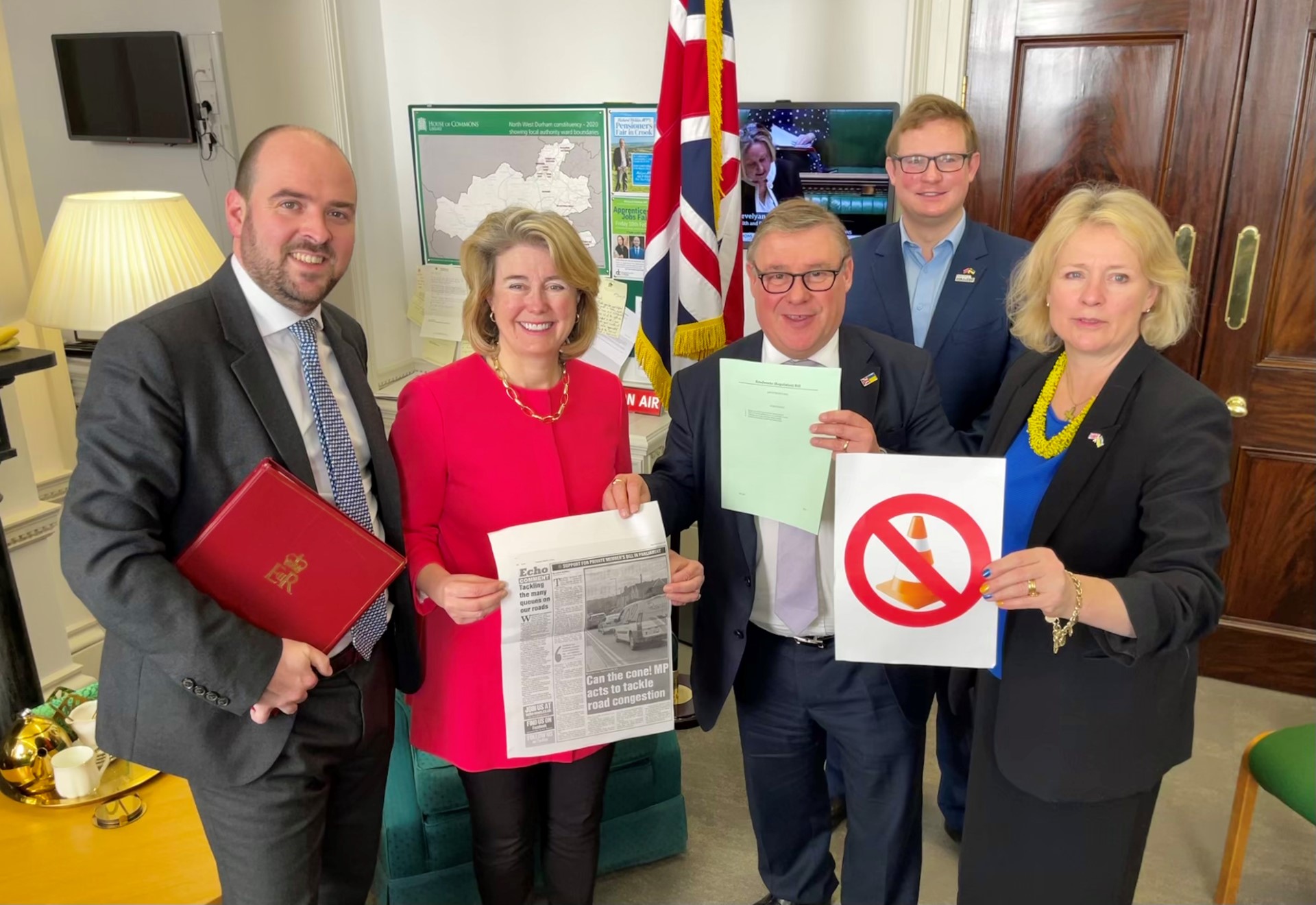
At the end of November 2023, Mark published his Roadworks (Regulation) Bill, the essence of which was aimed at trying to bolster the regulation of roadworks and thus curtail the seemingly endless increase of roadworks in England and help ‘Can the Cones!’
Mark published the Bill as one of the great frustrations of modern life is queueing for ages in a line of traffic, inching forwards to get through a set of contra-flow traffic lights at a set of roadworks, so that you can crawl past a large hole in the ground, heavily coned-off, with absolutely no-one working on the site as you finally drive past it. This is an issue that has been brought to my attention repeatedly by numerous concerned constituents of mine.
Sometimes it is utility companies carrying out repairs or maintenance, sometimes broadband providers laying new fibre, or property developers connecting up new estates to the power grid. In many cases, however, the common factor is a lack of any palpable sense of urgency to get the job done, regardless of the inconvenience which is caused to the travelling public.
The Bill essentially has three key aims:
Firstly, it would give local highways authorities much stronger powers to control the granting of permits to anyone who wanted to dig up the highway network. Under the 2004 traffic management scheme, permit arrangements were enabled, allowing utility companies to “book occupation of the street for specified periods for a specified purpose.”
However, currently highways authorities can only really refuse to grant a permit on safety grounds and, if those applying for one deem the work to be an emergency, the ability of the authority to refuse is even weaker still. The Bill would allow refusal on the grounds of causing unacceptable disruption and would materially strengthen the hand of councils to negotiate much tighter conditions, including stricter deadlines, when granting permits, so that companies would hopefully be prevented from over-running in the first place.
Secondly, the Bill would mandate highway authorities to take all practicable steps to “deconflict” roadworks in their areas, to prevent multiple works in the same neighbourhood from leading to near gridlock, especially during peak periods. Under section 59 of the New Roads and Street Works Act 1991, local authorities are required to co-ordinate roadworks to minimise disruption to road users. It states that “local authorities shall use their best endeavours to coordinate the execution of works of all kinds.”
But the truth on the ground—what really goes on in practice, rather than just in abstract policy—is that some local highways authorities are clearly not following those requirements. For instance, a few years ago we had near chaos in my home-town of Rayleigh, when several sets of roadworks, on the main arteries in and out of the town, were allowed to proceed at almost exactly the same time. When we subsequently looked into why, it turned out that the official at County Hall who handed out permits to developers did not communicate with the one who gave them to utility companies. One constituent put it to me at the time that “there seems to be no forethought or planning and no coordination—it’s ludicrous.”
The Bill would seek to rectify that by trying to ensure a much more joined-up approach, by imposing much stricter procedures on highways authorities that give out the permits, and it would also seek to prevent the same stretch of road from being dug up multiple times, in short succession, by different companies.
Thirdly, the Bill would materially increase the fines for roadworks that overrun. At present, under section 74 of the 1991 Act, local highways authorities have the power to fine utility companies for “unreasonably prolonged” occupation of the highway. The fine tariff is set out in the Street Works (Charges for Unreasonably Prolonged Occupation of the Highway) (England) (Amendment) Regulations 2012, which provide for a maximum charge for “traffic-sensitive” streets of £5,000 a day for the first three days of overrun and £10,000 a day thereafter.
Since its publication, Mark met the then Roads Minister, Richard Holden MP, to discuss the Bill’s main objectives and how this might be achieved, either by the Government adopting the Bill, or strengthened Government guidance on roadworks.

Mark meeting the previous Roads Minister, Richard Holden MP, with fellow MPs Anna Firth and Vicky Ford, to promote his Bill to help “Can the Cones.”
Alongside, the endorsement from the previous Roads Minister, Richard Holden MP, the Bill has the “full support” of the AA, who stated that "they fully support the objectives of the Bill."
Mark continues to push for the Department for Transport to adopt the legislation, or at the very least, strengthen government guidance, so that we can finally ‘Can the Cones!

The ‘Can the Cones’ logo.
